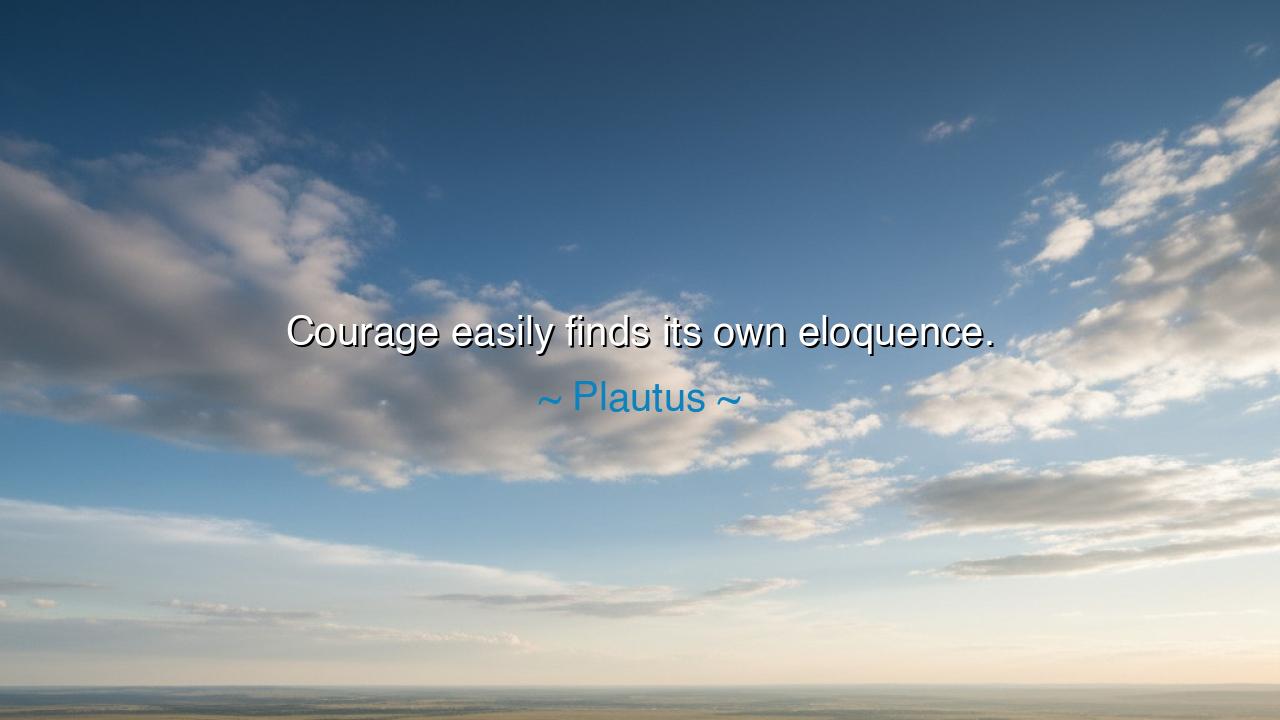
Courage easily finds its own eloquence.






“Courage easily finds its own eloquence.” Thus spoke Plautus, the Roman playwright whose words carried not only wit and laughter but also wisdom forged in the fires of human nature. In this brief yet profound saying, he unveils a timeless truth: that courage, when genuine, speaks for itself. It needs no ornament, no grand speeches, no elaborate display. When the heart is brave, the tongue follows naturally; when the spirit stands firm, the soul’s language flows freely. For in moments of great trial, words born of courage possess a power that artifice can never match — a truth that resounds through ages, from the heroes of the past to the quiet warriors of today.
The origin of this quote lies in the classical world of Rome, an age when valor was both admired and required. Plautus, though known for his comedies, understood the essence of the human heart. His plays revealed that even ordinary men, when called to act bravely, could become extraordinary. He observed that eloquence — the art of persuasion and noble speech — does not arise only from learning or rhetoric, but from the fire within the human spirit. The coward may rehearse his words and fail to move a soul, but the brave, even if untrained, can stir nations with the simple truth of conviction. Thus, courage, in its purity, makes the speaker eloquent, for it gives strength to the voice and sincerity to the heart.
True eloquence is not the art of decoration, but the art of truth. Words spoken from fear are hollow; words spoken from courage carry the weight of the eternal. In battlefields, in courts, in the streets where justice is demanded, it is not the polished speech that moves men — it is the voice trembling with conviction, burning with purpose. When one dares to speak or act with courage, the universe itself seems to lend them language. It is as if the soul, unshackled by fear, finds its truest expression. And in that moment, eloquence is no longer a craft, but a natural force flowing from integrity and will.
Consider the story of Harriet Tubman, a woman born into slavery who found in her heart a courage beyond comprehension. She could neither read nor write, yet when she spoke, her words carried the fire of freedom itself. She said, “I freed a thousand slaves. I could have freed a thousand more if only they knew they were slaves.” Her speech was simple, but her courage gave it wings. When she guided her people through the night toward liberty, her every whisper, her every command, carried an eloquence that no scholar could surpass. For courage speaks in deeds as much as in words, and through her, it spoke with the thunder of history.
Plautus reminds us that eloquence is not confined to poets or orators, but belongs to all who act with bravery. When a mother defends her child, her voice becomes powerful beyond measure. When a man stands against injustice though he stands alone, his silence itself becomes a speech of defiance. When one risks reputation or life for truth, their presence radiates the eloquence of courage. For the brave heart does not seek approval; it seeks only to do what is right — and that sincerity gives every word, every gesture, a majesty that cannot be imitated.
The world, however, often confuses eloquence with cleverness, and courage with recklessness. But Plautus calls us back to the root of both. Courage that is pure — born not from pride but from conviction — becomes its own language. It does not need translation, for it is understood by all. The trembling cry of the oppressed, the last stand of a soldier, the steadfast refusal of one who will not bow to tyranny — these are the true speeches of courage. They are not rehearsed, yet they ring eternal in the memory of mankind.
Therefore, my children, learn from this ancient truth: seek not to speak beautifully, but to live bravely. Let your eloquence arise from your courage, not your craft. When the moment of trial comes — when you must choose between silence and truth, between comfort and honor — speak or act with the bravery that wells from your soul. Fear not the judgment of others; fear only the death of your own integrity. For when your heart is courageous, your words, even if few, will move mountains.
And remember the wisdom of Plautus: “Courage easily finds its own eloquence.” Do not wait to be perfect before you act; act, and perfection will follow. Do not wait to be trained before you speak; speak, and truth will give you strength. For it is not the tongue that gives courage meaning — it is courage that gives the tongue power. When the fire of the spirit meets the moment of need, even the simplest voice can shake the world.






AAdministratorAdministrator
Welcome, honored guests. Please leave a comment, we will respond soon